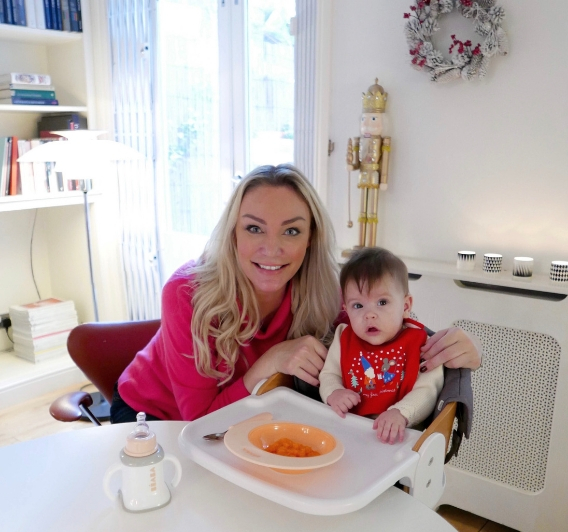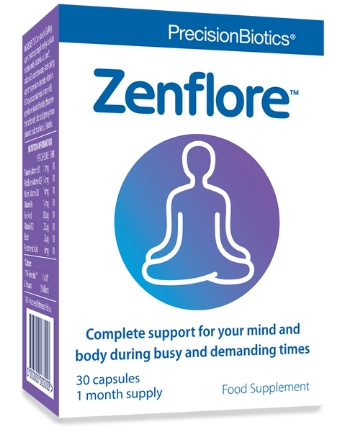Exciting new research suggests the key to better sleep might be in your gut bacteria. Editor Anna Magee reports on the rise of the new sleepbiotics
Louise Riis can’t remember a time when she hasn’t struggled to get to sleep. ‘I have had sleep problems since I can remember and they have always been in response to stress – exams, new jobs, work pressure…If something new or stressful happens in my life, my sleep is the first thing to go,’ says the 42 year old lifestyle blogger.
‘I worry a lot and the moment I put my head on the pillow I start thinking about things I need to do the following day.’ Louise’s problem with sleep has got worse since becoming a mum to Clara, who is now nine months old.

‘When I got pregnant with Clara, my sleep problems intensified and now I lie in bed worrying about why she won’t sleep, why she wakes up crying in the middle of the night, if I am feeding her correctly and when to call a doctor, if she has a fever.
‘I tried alternative remedies, black out blinds, cutting out coffee and just about every bit of sleep advice I had ever heard,’ says Louise, who lives in Kensington with her husband and baby remembers.
‘Sleeping pills worked, but they made me drowsy the day after and I certainly wouldn’t take them while I was pregnant or as a new mum as Clara often needs me during the night,’ says Louise, who runs the successful lifestyle blog louiseloveslondon.com.
Six months ago, having run out of options Louise turned to Google and began searching for a natural supplement for sleep that would work without any side effects.

‘I came across Zenflore, a probiotic supplement, whose reviews included many from people who had found relief from insomnia after taking it.
‘After a few weeks, I started to realise I was getting a much better sleep at night,’ Louise remembers. ‘My brain isn’t giving me the annoying ‘updates and analysis’ of everything that has been going on throughout the day. My boyfriend says that I am less moody and I am actually able to plan ahead without feeling under pressure. Basically, I can breathe again.’
Indeed, a consumer survey of Zenflore – a daily probiotic that has been shown in peer-reviewed medical research to help cope with everyday stress – users found that of those taking it, one in four had seen an improvement in their sleep, most of them after 2-4 weeks of use.
Could your gut bacteria be affecting your sleep?
Those who regularly sleep badly will be familiar with the myriad of potential fixes on offer. Exercise might help, as might certain nutrients, teas or foods. Then, of course there is always the option of benzodiazepines such as Xanax and Valium, but their addictive potential has been well documented and doctors constantly advise against taking them.
Now, a burgeoning field of scientific research suggests the secret to a better night’s sleep is our gut bacteria; that’s the trillions of microbes growing in our small and large intestines, also known as our microbiome.
‘This is an embryonic field right now in the annals of sleep research,’ Matt Walker, author of Why We Sleep and the director of the Center for Human Sleep Science at the University of California, Berkeley has said.
‘We know an enormous amount between a lack of sleep and appetite, obesity and weight gain as well as aspects of insulin sensitivity and glucose regulation. What we don’t fully understand yet is the role of the microbiome in sleep.’
Mood, stress, sleep – and your gut
Scientists don’t exactly know how the gut influences sleep but they do know that gut bacteria influences our moods and stress levels. In fact, people who live with depression and sleep poorly have been found to have poor gut bacteria, and the link between stress and mood and your gut is becoming clearer.
‘How the gut microbiota might influence brain, mood, behaviour and sleep and vice versa is not absolutely clear but there appear to be a range of possible mechanisms,’ says leading gut health expert Dr Linda Thomas PhD.

Firstly, your gut is responsible for the production of neurotransmitters that affect mood and regulate sleep such as dopamine, gamma-aminobutyric acid (GABA) – a key sleep modulator – and serotonin. ‘In fact, 90 per cent of the serotonin in the body is produced by the gut,’ says Dr Thomas.
Secondly, your gut bacteria has a direct effect on your immune system, explains Dr Eileen Murphy, PhD a research scientist with over 10 years experience in gut microbiome research.
‘Poor sleep is associated with increased inflammation in the body and probiotics have been shown to regulate the immune system and have anti-inflammatory effects so that could be another way that probiotics and gut bacteria could influence sleep,’ Dr Murphy explains.
The strain to look for
Probiotic supplements you buy over-the-counter are not all created equal. They all come from different families usually listed as Latin names such as bifidobacterium or lactobacillus and within those families, from different strains, which are usually listed as numbers.
There are thousands of different strains of probiotic supplements all of which have different purposes and the reason you need to read the label of the probiotic you’re choosing.
For example, the B. longum 35624 (brand name Alflorex) strain of probiotic has been studied for its specific effects on the symptoms of Irritable Bowel Syndrome.
Regarding the gut brain axis, the strain bifidobacterium longum 1714 also called 1714 Serenitas– was developed and researched in partnership with the University of Cork’s APC Institute – a world leader in microbiome research – specifically for its effects on stress and the brain (see the research below).
Welcome to the brave new world of the psychobiotic.
The probiotic that could help you sleep
We know that gut health is linked to our moods, thanks to the gut being known as ‘the second brain’ because it is responsible for the production of chemicals essential to our moods.
And likewise, right now the most compelling evidence we have for the way gut bacteria can influence sleep is through its influence on our moods and stress levels, Dr Murphy points out.
‘Stress and sleep are so highly related that if you can make an impact on stress, you can make an impact on sleep,’ she says.
That was certainly the case for Louise Riis, whose worst bout of insomnia was when she was working as a magazine editor and dealing with a severe illness in the family.
‘It was a struggle and I think the worst bout of insomnia I have ever had – for me sleep is directly link to how much stress I am under.
‘It’s been six months since I started taking Zenflore, and I’ve noticed I’m generally more relaxed and less stressed. I fall asleep almost immediately nowadays and I wake up refreshed, energised and positive,’ says Louise.

‘The Serenitas-1714 culture in Zenflore is totally natural and is part of the family of bacteria given by mother to baby at birth and naturally at home in the human gut, plus it doesn’t make me drowsy the next day, so I will be staying on it.’
And indeed, the Zenflore probiotic Louise took containing the Serenitas 1714 culture (see above) – though not studied yet specifically on sleep – has been shown to have a direct effect on stress levels.
Three years ago a team of researchers at University College Cork found that men who took a probiotic containing a strain of healthy gut bacteria for four weeks performed better in stress tests than those who took a placebo.
The findings, which were published in 2016 in the journal Translational Psychiatry found that the men taking the daily probiotic – which contained the strain bifidobacterium longum 1714 (also known as Serenitas 1714) which is the same one that is in the new Zenflore probiotic pill – also reported lower levels of stress and lower levels of the stress hormone cortisol in their saliva than those on placebo.
Stress, sleep and the cortisol connection
Cortisol is a stimulating stress hormone produced by the adrenal glands that is essential to the way we handle stress. Naturally, it should in our bodies in the morning, giving us the get-up-and-go to tackle tasks and get on with our day and fall in the evening, so we can calm down and get to sleep.
However, when you’re stressed, your body may have excess cortisol levels and this can contribute to insomnia. There is something called the ‘cortisol awakening response’ that stimulates the body to wakefulness in response to high cortisol.
Cortisol specifically plays a role in early morning wakefulness. When you wake up in the small hours worrying about that presentation you’re giving the next day, it can be a jolt of cortisol stimulating your system, because you’re stressed and it knows there’s something you need to deal with in the morning.
The participants in the University of Cork research mentioned above showed lowered levels of cortisol in their saliva after taking stress tests and also reported lower levels of social stress overall, after taking the Zenflore probiotic for four weeks.
Is your gut jet lagged too?
We also know that people with disrupted sleep habits – especially for example those with jet lag – have disrupted gut bacteria, says Dr Thomas. One study in Israel showed that this jet-lagged induced damage in the gut bacteria promoted glucose intolerance and even obesity, Dr Thomas points out.
Another study by Swedish and German researchers took a group of normal, healthy men with normal sleep patterns and found that when their sleep was disrupted by jet lag, so too fascinatingly, was their gut composition with in an increase in types of bacteria known to increase risk of obesity and type 2 diabetes.
Prebiotics and sleep
Other research has also looked at the effect of prebiotics – that’s foods and supplements that feed the good bacteria in our bodies – and found that they might also have a beneficial effect on sleep. ‘Prebiotics are important because they feed the good bacteria in our guts and help them grow,’ says Dr Murphy.
‘Fibre is essential because when we eat it, our gut bacteria ferments it and this process produces metabolite hormones and short chain fatty acids that are essential to health, including sleep, stress, weight management and even cancer prevention.’

Prebiotics can be found in many high fibre fruits and vegetables including root vegetables, artichokes, bananas, asparagus, sweet potatoes to name a few, as well as whole grains and legumes. ‘It’s yet another reason to get your five a day.’
March 15th is World Sleep Day
Zenflore costs £29.99 for a pack of 30 and £55 for a pack of 60 from precisionbiotics.com.
More Healthista Content:
How to be happy everyday – 7 surprising things that treally help
Menopause symptoms making you miserable? These natural fixes will help
The berry that can make you look younger
Like this article? Sign up to our newsletter to get more articles like this delivered straight to your inbox.






















































